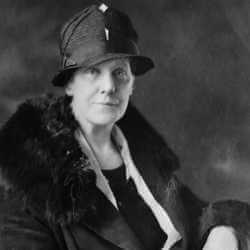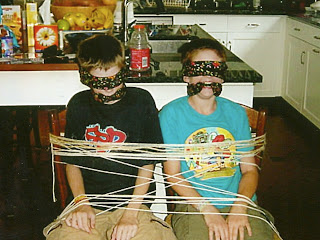Searching Google for a Happy Mother’s Day
By Susan Morse
On the big day in Ethiopia, mothers make a meat hash, smear butter on their faces, and dance.
In present-day Yugoslavia and Serbia, women wake up on their festal morning tied to the bedposts. Their children won’t release them without a candy payoff.
If you were lucky enough to be a mother in Mexico in 1942, you got a real treat: On this one very special day only, you could actually reclaim your pawned sewing machine at no extra cost!
I guess I could try tying my mother up, but the thing is I might be tempted to leave her there for the whole day. . . .
If you were a mother in Boston just after the Civil War, you might decide to fall in behind Julia Ward Howe, author of The Battle Hymn of the Republic, and push for a Mothers’ Day for Peace:
We women of one country
Will be too tender to those of another country
To allow our sons to be trained to injure theirs.
Mothers in late-nineteenth-century West Virginia had the option of joining one of Ann Marie Reeve Jarvis’s Mothers’ Friendship Clubs to help prevent infant mortality and nurse wounded soldiers, no matter which side they’d been fighting on.
Or, in response to post-war violence between neighbors in West Virginia, you could bring your soldier son, brother, or husband, fully armed, to Mrs. Jarvis’s Mothers’ Friendship Day event in the town square in Pruntytown. There, you’d all listen to a band play “Dixie” and “The Star Spangled Banner” and “Auld Lang Syne”, while everywhere around you weeping Confederate and Union veterans laid down their weapons at Mrs. Jarvis’s request.
Mrs. Jarvis was pretty special, and when she died on the second Sunday of May in 1905, her unmarried, childless daughter, Miss Anna Jarvis, vowed to create an official Mother’s Day. Miss Jarvis campaigned for years, and her vision was not a celebration of the power of mothers as social activists and diplomats, rather a more sentimental, intimate day of appreciation for our own mothers.
There has been considerable discussion of this difference on the Internet, and the crux of it seems to be the placement of the apostrophe: Mothers’ (meaning the universal group of all people with active wombs) vs. Mother’s (meaning your own mother).
Miss Jarvis’s Mother’s Day consisted of one simple gesture: carnations (her mother’s favorite flower) given out to everyone in church. She wasn’t quite satisfied, though, and she continued to write letters to leaders all over the country insisting on a nationally recognized Mother’s Day. With the help of wealthy Philadelphia merchant John Wanamaker and President Woodrow Wilson (who was dealing with other kinds of pressure from the women’s suffrage movement at the time), the dream became official in 1914, and Mother’s Day as we know it came into being with a proclamation touting the American mother as our country’s greatest source of strength and inspiration.
It seems to have all gone downhill from there.
The price of carnations began to quadruple in early May. Mother’s Day became all about buying things, candy and cards, and as a result, Miss Jarvis went a little berserk. She tried to control Mother’s Day by trademarking the name, and publicly accused Eleanor Roosevelt of “crafty plotting” to use it as a charity fundraiser without her permission. Lunching at Wanamaker’s department store, Miss Jarvis ordered their Mother’s Day Salad and dumped it on the floor.
Miss Anna Jarvis
There is a strong likelihood that the Floral Exchange had as much of a hand in Miss Jarvis’s dwindling popularity as her own hysterical behavior—“squelched” is how they put it. It seems that somewhere around the time she broke up a rally of the American War Mothers and was dragged away to jail, her credibility sort of tanked. There was speculation about why she never married, and people said Miss Jarvis’s blind sister Lillian accused her of keeping their mother all to herself. Rumors still circulate that neighbors heard shouting from the Jarvis home, which was supposed to prove that the whole Mother’s Day campaign was about Miss Jarvis’s guilt because her relationship with her mother was far from perfect.
The best thing I found on the Internet is that in Yugoslavia and Serbia on the Sunday before their Mother’s Bondage Day (which is what I like to call it) the tables are turned: Mothers get to tie up their children until they promise to be good. I had no idea there were other mothers out there who did this and got away with it.
Sam and Ben Morse, Philadelphia 2004
Here’s a typical Hallmark take on mothers:
A mother’s love is undemanding
Patient kind and understanding
Quick to give encouragement and thoughtful words of praise;
A mother’s love is warm and gentle
Generous and sentimental;
A mother’s love is precious in so many special ways.
When early-twentieth-century slackers began to fall back on sending cards like this, it made Miss Jarvis crazy. Sticking a stamp on a pre-printed card and tossing it in the mail was “a poor excuse for the letter you are too lazy to write.” I can see her point, and besides, I’ve got baggage that makes a poem like this upsetting on a more personal level. My own particular mother’s love has been far from “undemanding” and, to be quite fair, I have not always been exactly “patient kind and understanding” about her lack of undemanding-ness.
We’re doing better now. But at first, when our children were too little to grasp what was expected of them, my husband often had to travel for work in early May (this happened far too often to be a real coincidence). And, because my mother seemed to assume I’d want to spend as much of the day as possible honoring her, and I had not yet had enough therapy to figure out how to reconcile these various factors into something tolerable for everyone, a tradition evolved organically: Mother’s Day was my special day to be the opposite of warm, gentle, generous and sentimental. Instead, I’d behave like a complete infant.
I’d somehow manage to include my mother in our plans while contriving to spend as little time in the same room with her as possible. (There is a whole technique to this.) And, from the moment we all woke up in the morning, if any of the kids complained for one second about getting ready for church, or if siblings exchanged a single cross word, I’d fling myself on the floor in spasms of breast-thumping self-pity. PLEASE, PLEASE, not on MOTHER’S DAY!!!!
Me and kids, 1995. This picture was not taken on Mother’s Day.
I’ve been polling friends and family. Response has been revealing but cautious—people now know I have a bit of a public platform and some don’t want to get mixed up in my tendency to dance around on this dangerous edge of flamboyant oversharing. I will name no names, but what I’m hearing is that mothers are conflicted about Mother’s Day. Single mothers can have an awful time of it. Women whose husbands don’t step up and teach their children what to do suffer silently (since therapy, silent suffering has not been my problem). Many fall back on the old standby: Every day should be Mother’s Day!
And a whole lot of us are haunted by lingering self-doubt. We can’t embrace the attention with an easy conscience, because we don’t believe we measure up to that saintly Hallmark ideal.
Imagine what Mother’s Day is like for little children who don’t have mothers in their lives at all. People who are estranged from their mothers, and vice versa. Women who wish they were mothers but aren’t. It might be best if we all skipped the brunch, went to hospitals, and just held crack babies on Mother’s Day. I’ll bet Miss Jarvis’s social activist mother would approve of that!
I know someone who sneaks out of the house into the city early every Mother’s Day to run the Race for the Cure for breast cancer. I am no longer a runner, but during the Bush era I seriously considered spending the day in Washington, DC, at a women’s march for gun control.
My Republican mother did not approve of this idea at all, which was part of why it attracted me so much. David and the kids insisted it was all up to me. Whatever makes you happy, they said, keeping their tone as neutral as possible. But in the end I couldn’t bring myself to part with family on Mother’s Day; it just felt wrong.
Miss Jarvis spent all of her considerable inheritance trying to stop the runaway Mother’s Day train. In the last years of her life she was deluged every year on the second Sunday of May with thank-you cards from all over the world (Hallmark?!), and confined, because of dementia, to a mental institution outside Philadelphia. They say the Floral Exchange covered the bills.
Will Rogers, keeping it simple in 1935:
Mother’s Day, it’s a beautiful thought, but it’s somebody with a hurtin’ conscience that thought of the idea. It was someone who had neglected their mother for years, and then they figured out: I got to do something about Momma. And then they says well, we’ll give Momma a day, you know, and knowing Momma was that easy they figured well we’ll just give her a day and it’ll be all right with Momma.
I do have faith that some day soon our family will have the perfect, ultimate Happy Mother’s Day. It’s been getting better every year, really! Should we try that Ethiopian butter-smearing hash dance next? Actually, please don’t anyone show this to my kids. I think they know where we keep the rope. . . .
Susan's Author Page:
http://www.openroadmedia.com/authors/susan-morse.aspx
About Susan Morse (from her authro page :
Other than two years in Ireland in the sixties and a stint at a Newport Rhode Island boarding school during my teens, I spent most of my childhood in Philadelphia, where I was born in 1959. I majored in theatre and French at Williams College and then moved to New York, planning to become a wildly sought-after actress specializing in the classics. This got me as far as an off-off-off theatre in the Bowery, where I played Lady Macbeth for six heady weekends. (Most nights our cast outnumbered the audience, which worked well because it made my sleepwalking scene particularly spooky.)
I met my husband David in 1981 across the bar I was tending near his apartment in Hell’s Kitchen. It may have been foolish, but I agreed to go on a date almost immediately, which, due to conflicting schedules, meant I had to see him in a play (this turned out to be sort of convenient, as it gave me a chance to figure out his last name by checking the playbill). Not long after his first entrance, I decided it would be best to marry him as quickly as possible.
I studied Meisner technique at the William Esper Studio, and we then moved to Los Angeles for David’s work. Over a six-year period I managed to build up a bit of a resume – small movies, television, and plays. I was George C. Scott’s daughter on Mr. President, Colleen Dewhurst and Candice Bergen’s sparring partner on Murphy Brown, Peter Riegert’s one-night stand on The Twilight Zone, and somebody’s dead lesbian lover in an episode of Hotel. I ran a program on the side teaching horseback riding to disadvantaged kids, and I became a member of a theatre company, Circle Rep West. After we had our daughter and twin sons, things got complicated: Roused in the night by the Northridge earthquake in 1994, we found we had to leave our ruined house for good. So, within weeks, we landed back East in Philadelphia. Because I had always loved to read, I stopped acting and began editing books, freelance.
A few years ago my elderly mother got sick and we had some outrageous adventures trying to get her stabilized. It was stressful. I emailed nightly update rants to my siblings, and it turned out they were entertaining in a warped sort of way. A sister told me I had a book, and so I began to collect notes in earnest, becoming more and more amazed at the classic arc that unfolded. It wasn’t just that my mother decided to drop everything at one point and become an Orthodox Christian nun. We had a damsel in distress (actually two, if you count me), a villain, a chivalrous knight, a whole background cast of those bumbling peripheral characters you get in Shakespeare and Chekhov, and even a stunning deus ex machina twist at the end. All I had to do was carry around a notebook, convince my mother her rectal cancer nightmare was worth sharing with the masses, and try to come up with a catchy title: The Habit.
*Guest post provided by Open Road Media and author Susan Morse.




I cried and laughed all at the same time while reading this! Thank you so much for sharing this!
Replyvery truthful and made me sad. Thanks for sharing this!!
Reply